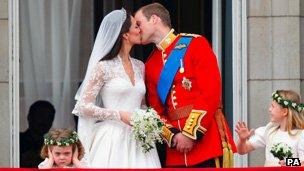Do bank holidays cost the economy?
- Published

Britons are enjoying an extra bank holiday to celebrate the Diamond Jubilee, but estimates of its economic impact vary wildly. So what does an additional day off actually mean for the UK's balance sheet?
For some, it will be a day to celebrate six decades of the monarch's reign. For others, it offers a chance to spend a bit of time with the family or catch up on DIY.
Weighing up the costs and benefits to the British economy of the extra bank holiday on 5 June might be a less obvious Diamond Jubilee activity.
But with the country in recession, the fiscal impact of the bonus break is a very real concern to the keepers of the national purse-strings.
In March, Sir Mervyn King, the Governor of the Bank of England, told the House of Lords' Economic Affairs Committee he expected a fall in output between April and June as a result of the lost working day.
But exactly what the impact will be on gross domestic product (GDP) is a tricky matter to pin down.
In April, a report by the Centre for Economics and Business Research suggested that each bank holiday costs the UK economy £2.3bn and scrapping the lot of them would boost annual output by £19bn, although the think tank admitted the task of quantifying the impact was "difficult".
By contrast, an impact assessment of the extra 5 June break by the Department for Culture, Media and Sport put the "best estimate" at a £1.2bn loss to the economy.
However, this was within a broad margin of error. It said there could, in fact, be a boost to the economy as great as £1.1bn to GDP - or a loss of as much as £3.6bn.
After all, some sectors - such as leisure, hospitality, retail and, indeed, bunting manufacturers - might expect a boost in takings as workers spend their bank holiday shopping, eating out or visiting tourist destinations.
"There's no easy relationship between having a bank holiday and the rate of GDP," says Les Mayhew, professor of statistics at Cass Business School.
He points out that, when calculating the impact of an extra days off, it is important to distinguish between what is genuinely lost from the economy and spending that has just been delayed.
For instance, a car owner who might otherwise have taken their vehicle for its annual service on 5 June, only to find the mechanics were having a day off, would most likely reschedule soon after.
Likewise, many office workers could avoid a drop in productivity by anticipating the extra day off, working overtime to compensate for the lost shift.
But in some sectors, a missed day cannot be made up again. A cafe that relies on lunchtime trade from employees in the office complex next door will lose a day's trade that cannot be recouped.
"What you could measure is the productivity of assets that are left idle for a day - the ship that doesn't get built and so on," Prof Mayhew adds, with the caveat that the British economy is far less dependent on building things like ships than it was half a century ago.
Certaintly, output can be measured after the event.
April 2011 saw an additional bank holiday granted to coincide with the royal wedding. According to the Office for National Statistics (ONS), GDP fell by 0.1% in the second quarter of 2011.
Nontheless, April 2011 saw a range of other special events which could just as easily be responsible.
"You can't say the royal wedding was worth x per cent," says Jacqui Jones, a statistician with the ONS.
"We also had the warmest April in 100 years and the Japanese tsunami, which had an effect on supply chains. You can't disentangle everything that was going on."

Charming - but how much did 2011's royal wedding bank holiday cost the British economy?
Indeed, researchers poring over statistics to assess the impact of the extra 2012 bank holiday will have to take into account the fact that it coincides with the half-term holiday in much of the country as well as the effect of the forthcoming Olympic games.
At a press conference in May, Spencer Dale, the Bank of England's chief economist, said his "best guess" was that the 2011 royal wedding break had reduced growth in the second quarter by around 0.4 percentage points - although according to the Bank's estimates, this was subsequently recovered.
Dale added that he expected the extra holiday to have a slightly larger impact on the second quarter of 2012 - but only because it falls later in the month than its 2011 counterpart, meaning businesses have less time to make up output within the quarter. By the end of the third quarter, he said, it was reasonable to expect a "bounce back in growth".
Of course, this can only be measured after the event.
But organisations representing both sides of industry in the UK say they are confident the economy will not be unduly affected.
A spokesperson for the Confederation of British Industry says business leaders recognised it was "entirely appropriate" to have an extra bank holiday to mark the Jubilee and "have been factoring it into their planning for some time".
At any rate, Paul Sellers, working time policy officer at the Trade Union Congress, argues that the extra day off may help the economy in ways that do not show up on a balance sheet.
"There will be some societal benefits - lifting the national mood, for instance," he says. "Of course, it's impossible to measure the effect of this."
Some things, after all, are especially difficult to calculate on a bank holiday.